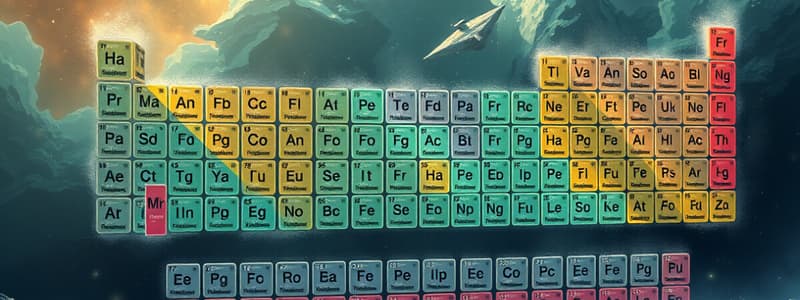Podcast
Questions and Answers
How did Mendeleev organize the elements in his periodic table?
How did Mendeleev organize the elements in his periodic table?
Mendeleev arranged the elements into rows in order of increasing mass so that elements with similar properties were in the same column.
Why did Mendeleev leave blank spaces in his periodic table?
Why did Mendeleev leave blank spaces in his periodic table?
The blank spaces were for elements that had not yet been discovered.
What evidence helped verify the usefulness of Mendeleev's table?
What evidence helped verify the usefulness of Mendeleev's table?
The close match between Mendeleev's predictions and the actual properties of new elements showed how useful his periodic table could be.
How is the modern periodic table organized?
How is the modern periodic table organized?
How do the elements in a group relate to one another?
How do the elements in a group relate to one another?
What does the atomic mass of an element depend on?
What does the atomic mass of an element depend on?
How are atomic masses weighted averages?
How are atomic masses weighted averages?
What categories are used to classify elements on the periodic table?
What categories are used to classify elements on the periodic table?
What are some characteristics of metals?
What are some characteristics of metals?
What are some characteristics of nonmetals?
What are some characteristics of nonmetals?
What is a characteristic of a metalloid?
What is a characteristic of a metalloid?
How do properties vary across a period in the periodic table?
How do properties vary across a period in the periodic table?
Why do the elements in a group have similar properties?
Why do the elements in a group have similar properties?
What are some characteristics of alkali metals?
What are some characteristics of alkali metals?
What are some properties of the A groups in the periodic table?
What are some properties of the A groups in the periodic table?
Flashcards are hidden until you start studying
Study Notes
Mendeleev's Periodic Table
- Mendeleev organized elements by increasing atomic mass, grouping similar properties in vertical columns.
- Left blank spaces for missing elements, predicting their existence based on trends in properties.
Verification of Mendeleev's Table
- Close alignment between Mendeleev's predictions and actual properties of newly discovered elements validated the table's usefulness.
Modern Periodic Table
- Current arrangement of elements is by increasing atomic number (the number of protons).
- Element properties exhibit periodic repetition when ordered by atomic number.
Group Properties
- Elements in the same group share similar properties due to identical electron configurations.
- Electron configuration significantly influences an element's chemical behavior.
Atomic Mass
- Atomic mass depends on the distribution and masses of an element's isotopes in nature.
Weighted Averages
- Commonly occurring isotopes exert a greater influence on the atomic mass, representing a weighted average.
Classification of Elements
- Elements are categorized as metals, nonmetals, and metalloids based on inherent properties.
Characteristics of Metals
- Metals typically exist as solids at room temperature and are characterized by malleability and ductility.
Characteristics of Nonmetals
- Nonmetals are generally poor thermal and electrical conductors, can be gaseous at room temperature, and are often brittle in solid form.
Properties of Metalloids
- Metalloids possess mixed properties, falling between metals and nonmetals, and their electrical conductivity varies with temperature.
Variation Across Periods
- Moving from left to right across a period, elements transition from more metallic to more nonmetallic properties.
Valence Electrons and Group Similarities
- Similar properties among group elements arise from having the same number of valence electrons.
Alkali Metals
- Alkali metals have one valence electron and are highly reactive, found naturally only in compounds due to their reactivity level.
Reactivity Trends
- Reactivity among alkali metals escalates down Group 1A. Alkaline earth metals show varying reactivity with water.
- Aluminum is the most prevalent metal in Earth's crust, while oxygen is the most abundant element overall.
Chemical Properties and Group A
- Halogens, despite physical variations, share similar chemical properties.
- Noble gases are characterized by being colorless, odorless, and exceptionally unreactive.
Studying That Suits You
Use AI to generate personalized quizzes and flashcards to suit your learning preferences.




